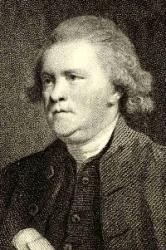1780 - 1861 Hymnal Number: 166 Author of "From Calvary a [the] cry was heard" in Social Psalmist Cunningham, John William, M.A., was born in London, Jan. 3, 1780, and educated at St. John's College, Cambridge, where he graduated in honours, and subsequently became a Fellow of his College. In 1802 he was ordained to the Curacy of Ripley, in Surrey. The following year he removed to Ockham, and later to Clapham, where he was curate to the Rev. John Venn, who was the original of Berkeley in The Velvet Cushion. In 1811 he was presented by his family to the Vicarage of Harrow, which he held for fifty years. He died Sept. 30, 1861. He published, in addition to pamphlets on various subjects:—
(1) World without Souls, 1805; (2) The Velvet Cushion, 4th ed. 1814; (3) De Ranee, a Poem, 1815; (4) Morning Thoughts on the Gospel of St. Matthew, 1824; (5) Morning Thoughts on the Gospel of St. Mark, 1827. The two series of Morning Thoughts contained hymns which were given without any signature. As there is an acknowledgment that with the verse, in the first case he was assisted by "a friend," and in the second “by friends," it is impossible to distinguish his work from that of his "friends."
With his name and publications the following hymns are associated:—
1. As the sweet flower that scents the morn. Death of an Infant. This poem appeared in The Velvet Cushion (4th ed. 1814, p. 157), in 6 stanzas of 4 lines. ln1826 it was given in a revised form as a hymn in 3 stanzas of 4 lines in the American Episcopal Psalms & Hymns, No. 127. In the Unitarian Hymns for the Church of Christ (Hedge & Huntington), 1853, No. 762, it is increased to 4 stanzas. It has been attributed to Allan Cunningham, but in error.
2. Dear is the hallowed morn to me. Sunday Morn¬ing. This was given in Oliphant & Sons' Sacred Poetry, 4th ed., 1822, in 8 stanzas of 4 lines, and signed "Cuningham." In 1833 Bickersteth gave stanza i.—iii., vi., as No. 639 in his Christian Psalmody, beginning, "Dear is to me the Sabbath morn." This has been repeated in English and American collections.
3. From Calvary a cry was heard. Good Friday. Published in his Morning Thoughts on St. Matthew, 1824, p. 103, in 5 stanzas of 4 lines. It is in somewhat extensive use In America, and sometimes in 4 stanzas as in Dr. Hatfield's Church Hymn Book, 1872, No. 460.
4. How cheering the thought that the spirits in bliss. Ministering Angels. Published in his Morning Thoughts on St. Matthew, 1824, p. 15, in 2 stanzas of 4 lines. In Bateman's Sacred Melodies, the Scottish Presbyterian Hymnal for the Young, 1882, &c, and several American collections, it is given as "How [dear is] delightful the thought that the angels in bliss."
5. The God of Israel never sleeps. Watchfulness. Published in his Morning Thoughts on St. Mark, 1827, p. 103, in 3 stanzas of 6 lines. As No. 548 in Kennedy it is in an altered form. [William T. Brooke]
--John Julian, Dictionary of Hymnology (1907)
J. W. Cunningham


 My Starred Hymns
My Starred Hymns



